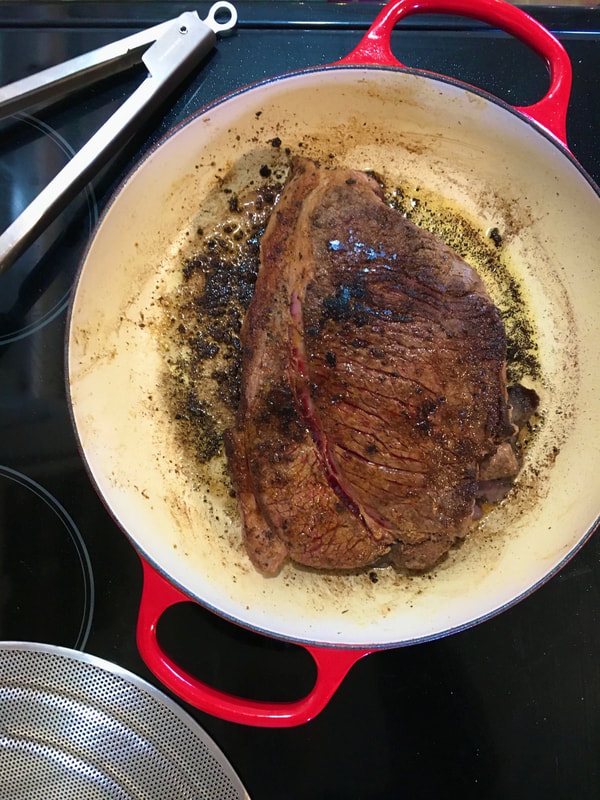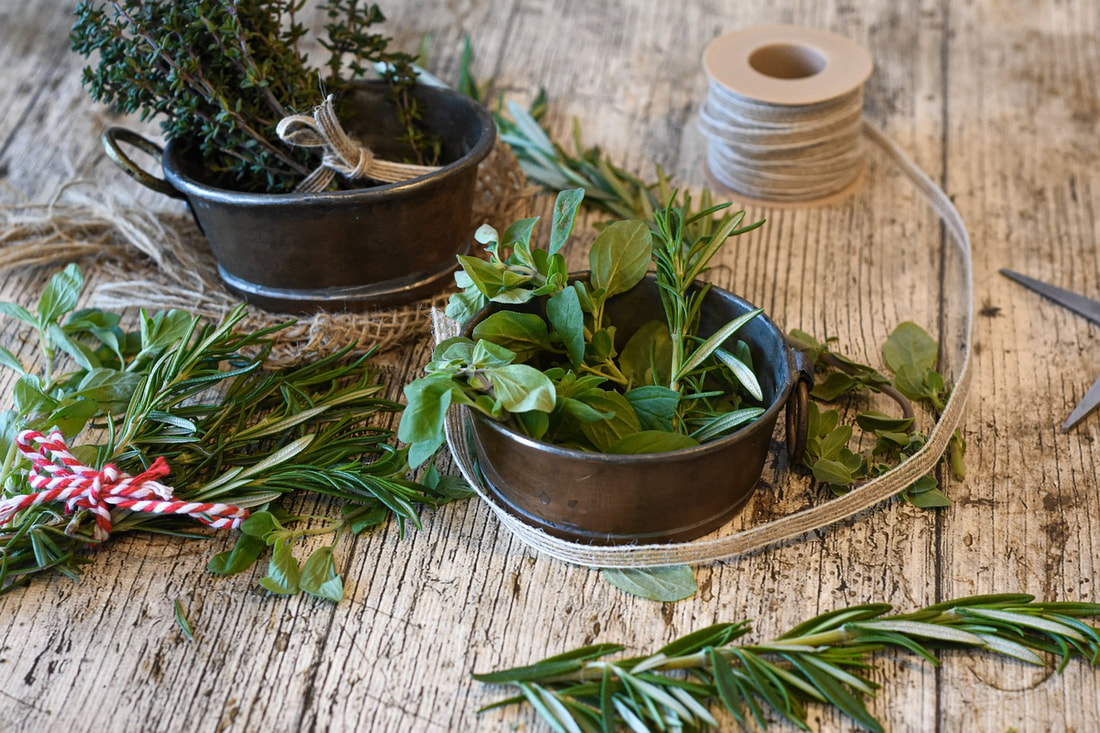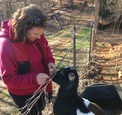The Best Pineywoods Beef Roast Recipe
One of my favorite Pineywoods roast recipes was inspired by Mike. He loves a red beer (beer, tomato juice, salt and pepper) on a hot summer evening. I had seen a recipe that added beer to the roast and another that added tomato paste stirred into water. I asked Mike if i should add beer or tomato paste to the roast, he said "why don't you add both.". What resulted was the most savory and delicious roast I have ever had.
There is a misconception that all grass fed and grass finished beef is dry and leathery. The truth is, it depends on a combination of things including the breed, the forages they have access to and the cooking method. Pineywoods Cattle ran wild for close to 400 years. The Pineywoods herd at Ozark Akerz thrives on wild growing grasses, herbs, shrubs, trees and weeds. The chefs and butchers we work with are consistently surprised by the marbling and flavor that our wild foraged and dry-aged Heritage Pineywoods Beef has. In fact, a butcher with 30 years experience who saw the marbling recently asked us how much grain we finished the cattle on. When we told him we don't feed them any grains, he asked what kind of fancy grass we had them on, he was equally surprised when we told him plain old fescue and the forages I mentioned above. With winter here, I'm ready to cook roasts again. The 100 year old farmhouse at Ozark Akerz is not the warmest place during the winter months. A flavorful cut of Heritage Pineywoods Beef roasting in the oven not only fills the house with a wonderful aroma, it helps keep the kitchen nice and toasty. Here's my recipe:
Brown brisket on all sides - you can also use chuck or rib roast. Browning the roast brings out a lot of flavor. This is known as the Maillard reaction. It is important to pat the roast dry prior to browning - otherwise the beef steams instead of brown. I've browned roasts in bacon grease, lard, tallow (beef fat) and schmaltz (chicken fat). They are all good! I've found that the best results occur over medium to medium high heat. This should be a slow browning process, so take your time and be sure each side is fully browned. Once browned, mix beer and tomato paste and pour over brisket. Season, cover and put in the oven at 350F for 3-3.5 hours. I find that the roasts turn out most juicy and tender when cooked in a Dutch oven, as good or better than a slow cooker.
0 Comments
Pineywoods Beef Jerky - An Easy, Tasty Recipe
A winter tradition at Ozark Akerz Regenerative Farm is to make a big batch of beef jerky with about ten pounds (4.5 kg) of Pineywoods beef roasts, a little pepper, and a little salt. No fancy marinades and the flavor is amazing!
When I lived in Rhodesia (now Zimbabwe) as a kid, there was nothing better than a piece of biltong which was usually made of beef but sometimes kudu. When I moved to Canada at the age of 8 my beloved biltong was replaced by beef jerky which was almost as tasty. Over time the quality of store-bought jerky has deteriorated badly. The added flavors have taken the place of true beef flavor. Most homemade jerky recipes emphasize the marinade. We love the flavor of our Heritage Pineywoods Beef so much, we don't want to cover it up. We have made jerky with venison, but the flavor of Heritage Pineywoods Beef is by far our favorite. Everyone that tries it loves it. Jerky making has become a new Christmas tradition, then we make another batch in January, it doesn't last long! Winter is the best time for jerky making because running the oven or dehydrator for long periods of time helps heat the house. Our ultimate goal is to learn to dry over an open fire, more on that once we've figured it out. What you'll need to make Pineywoods Beef JerkyThe Perfect Seasoning Recipe For Beef and Poultry
Our journey to healthy living and eating at Ozark Akerz has taken a lot of forms, both expected and unexpected. The unexpected have included brewing our own beer with wild-growing ingredients like cedar, passion flower (maypop) and ragweed. The obvious has included growing our own herbs. We have herbs growing in the ground and in pots all year long, giving us a lot of ingredients to experiment with and improve the seasonings we use in food. Right now we have rosemary, mint, 2 varieties of oregano, basil, thyme, marjoram, Italian parsley, sage and tarragon growing.
We use these herbs to season everything from homemade beef sausage to moussaka, and this time of the year, turkey, stuffing and many other Thanksgiving dinner sides. Before we started growing our own, we had already discovered that fresh was best. But we often found fresh herbs sold out around Thanksgiving and prices were steadily increasing. Herbs are easy to grow and care for and as a household that cooks a lot of meals, they provide a regular supply and a lot of savings. We are never sold out and we dry some of them for use out of season. This can be as easy as laying out thyme or oregano on a paper towel or stringing together rosemary and hanging it to dry. The most important thing is airflow, we set or hang the herbs under a ceiling fan. The art of seasoning a turkey or any other meal has been an ongoing learning process. Sue is an alchemist in the kitchen, she is always experimenting. Her standard answer to Mike saying "that's the best tasting ___ " (fill in the blank with just about any creation) is "Well, we'll never have that again!". Her culinary inspirations and experiments are often spontaneous and she rarely writes down the amounts let alone the ingredients. A few weeks ago we were talking about how much positive feedback we had received for the radish recipes we shared from our social media community. Sue said she had begun to think about another recipe for our blog, A week later she said our Ozark Akerz Savory Seasoning would be perfect to share as a poultry seasoning for Thanksgiving dinner. The following week she broke with tradition and wrote down the recipe when she was making another batch. We call it Cock n' Bull because it's as good on poultry as it is on beef. Use it as you would poultry seasoning on chicken and turkey. We have also used it on beef roasts, brisket and ground beef with other ingredients to make our version of beef sausage. Sue is on a roll to break tradition again, She is working on documenting our Pineywoods beef sausage recipe. Watch for it in a future blog post! You can either use store bought or home-dried herbs for this recipe. Weit in a 1/2 pint mason jar. Ozark Akerz Savory Seasoning Recipe
3 tablespoons dried thyme
3 tablespoons dried sage 2 tablespoons dried marjoram 1 tablespoon dried rosemary 1 tablespoon freshly ground pepper 1/4 teaspoon grated nutmeg 1 tablespoon paprika 1/4 teaspoon cayenne Optional: 1/2 teaspoon smoked paprika 1/2 teaspoon dried savory
Other Ozark Akerz recipes that Sue has captured (after much hounding by Mike!):
Danish Liver pate Sue-Baby's Marinade and BBQ Sauce
If you're not already subscribed to our YouTube channel, become a subscriber and click the bell icon to be notified when we release new videos.
Support Ozark Akerz. Get your official Graze Against The Machine Merchandise or original art prints here |
Categories
All
Archives
April 2024
Check out our YouTube channel
Copyright © Turboxark Inc 2014-2024 - Terms of Use
|






 RSS Feed
RSS Feed